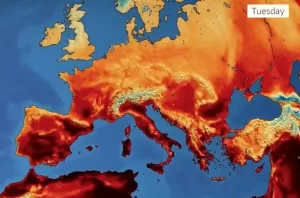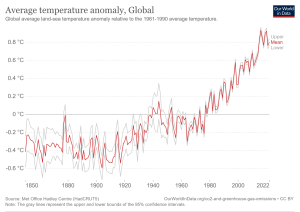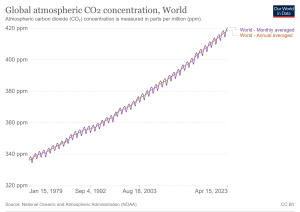This article was written by Ali Fleming, an Extinction Rebellion activist. It argues that only system change can help us now. It was first posted by rs21.

The Cerberus heatwave has lived up to its savage name with extreme temperatures that have been deadly for Southern Europe. While it was easy to ignore the catastrophes in the global south, such as last year’s floods in Pakistan and the current, devastating famine in East Africa. The impact of global overheating is now at our door and we’re finally paying attention.
To make it understandable, news reports focus on the impact on our western way of life. Last winter, global heating was in the headlines because there wasn’t enough snow on the ski slopes. Now, people’s summer holidays are ruined. An unfunny coincidence that the have-it-all lifestyle damaged by the climate crisis is what helped bring us to the problem in the first place.

System change not climate change
The catastrophic floods and heatwaves this year are no surprise to anyone who has listened to the increasingly urgent warnings of climate scientists and activists. While they frantically sound the alarm, though, most people just aren’t hearing it. And if they hear, they’re not yet heeding it.
But why not?
The stark truth is that we face the collapse of our planetary life support systems and, with that, societal collapse. To prevent this needs radical system change – of politics, economics and the culture of over-consumption. But corporations, notably the big coal, oil and gas companies (and the politicians they so ably fund) are not motivated to act on the crisis because business as usual makes them so much money.
Indeed so strong is their pursuit of wealth, they actively obstruct change and policies that gives us a chance of preserving a liveable planet.
The capitalist system is rigged to pursue profit and growth as the primary and only goal, and the increasing financialisation of the markets – that sees even Tories stepping beyond traditional Conservative ideology – has disabled every brake, every lever, that sanity and civil society can act upon to change course.
In the face of this active harm, we have a duty to act now and do everything we can to resist and disrupt this system that’s driving climate collapse.
The oil industry has known about the impact of man-made climate change for decades. And their deliberate and malicious campaign of concealment and denial, well explained in the ‘Big Oil vs the World’ documentary, has been hugely successful. That there is even a debate about the cause and significance of global overheating is a carefully and wilfully constructed diversion and delaying tactic.
So if oil companies aren’t willing to change, can’t we rely on state intervention to drive the necessary change through regulation and enforcement of carbon emissions?
Politics is broken
Big hitters like the USA and Europe are ‘climate leaders’ only to the extent that they’re historically responsible for the majority of cumulative carbon emissions. The UK government is rightly criticised for lack of any real action to tackle the crisis. Indeed it faces legal action for inadequate planning to meet its own legally binding climate targets and even the chair of the government’s own Climate Change Committee, has spoken of the urgent need for radical change – and in defence of Just Stop Oil protestors.

The social contract between governments and citizens demands that the primary role of governments should be to keep their citizens safe yet governments, across the world actively aid and abet the deadly activities of fossil fuel companies. This simply highlights the extent to which democratic institutions have been captured by corporate interests.
Money matters here – direct and indirect subsidies to oil and gas topped an eye-watering $5.9 trillion in 2020; donations and gifts from fossil fuel companies to politicians and the revolving door that gives lucrative jobs to politicians after leaving office keeps this cosy relationship going. Right-wing think tanks funded by oil moneyinfluence policy, including the ongoing crackdown on protest rights, targeting activist groups like Extinction Rebellion and Just Stop Oil.
Justice turns a blind eye
Some still have faith in legislative changes and the administration of justice by the courts. However, the legal system is an arm of the state and can only enforce Parliament’s laws. New UK legislation is whittling away the ability of civil society to hold the government and big business to account.
Recent changes to law and policing make protest increasingly perilous, curtailing long-established protest rights and ushering in more punitive penalties. Arbitrary powers for Police to stop and search protesters, planned legislation targeting the right to strike and organise a boycott is not a dystopian future, it’s now.
We are losing the chance for dissent and hard-won levers for change.
Words matter
Politics is also held hostage by the mainstream media. Owned and controlled by a handful of non-doms and billionaires with vested interests in business-as-usual and oil and gas. Whipped up culture wars have become the emblem of the twenties. The narrative from major news outlets creates social division with the vilification of protestors, refugees, foreigners, strikers and health workers. This heady mix is amplified on social media with click bait and an army of bots, conspiracy theorists and malevolent actors.
The rise of populism is hollowing out democratic institutions.
We’re seeing democratic processes across the world captured by corporate interests, and it’s difficult to see how the existing system could ever generate the radical changes needed. Indeed, even where there is leadership on climate, such as the UN climate groups and even the Secretary General, it lacks the teeth to drive change. They can only plead with foot-dragging states who depend on the patronage of corporate monoliths and media barons.
Skewed priorities
Nothing is allowed to stand in the way of the pursuit of profit. Old-growth forests of thousand-year-old trees are reduced to their monetary value as timber. Indigenous land rights are trampled as sacred sites are mined for resources, along with the rich biodiversity of the Amazon rainforest and the Great Barrier reef that is part of our collective and irreplaceable planetary heritage. More worryingly, even the push for ‘green growth’ – low-carbon versions of what we have now – will heap on economic and racial injustice in the race for rare-earth minerals.
And while of course low-income communities are destroyed first in ‘sacrifice zones’soon enough this will take in other homes and communities too.
The cause of the problem cannot also be the solution. Corporate giants sanitise their image with PR and marketing while actively lobbying against climate mitigation measures and commitments. This isn’t limited to fossil fuel giants such as Shell and BP – check out the misleading claims of other planet wreckers from airlines to car producers.

The culture of consumerism has captured our preferences and our concept of what a good life is. It’s created wants we don’t need to sell us things that won’t satisfy us but it’s so easy to be seduced by empty promises of happiness, sexiness and success. We’ve been made to forget satisfaction with nature’s bounty and instead want without regard to planetary boundaries of biodiversity loss, global heating and resource extraction.
System change to rebalance wealth
We’re bombarded with messages to swallow this bitter pill for the sake of our jobs, our bills, our homes, feeding our children – of course we can’t afford net zero! There’s no option left but to participate in our own destruction.
But wealth accumulation of the super-rich is booming as never before and the wealth divide widens. Observe how the use of private jets has shot up at the same time as record increases in the cost of living, demand for food banks and rising household debt burdens.
These issues cannot be separated from the climate crisis because they’re products of the same system. Artificial scarcity is a function of capitalism to generate profit.
This isn’t about the enduring habit of humans to exchange goods and services, but being prisoner to an economic model whose only metric is the generation of profit and economic growth. The same system that relies on extracting value from natural resources and cheap labour, treating humans and the natural world alike as resources to be exploited.
The wage economy and cost of living keeps people and families in a constant struggle with end-of-the-month anxiety. Property prices and student debt make sure that even the professional classes are hobbled by debt. The system gives us just enough for us to be scared of losing it by rocking the boat. With half of all tenants just one paycheque away from homelessness, it’s no wonder some people react with anger to being delayed on their way to work by climate protesters.
‘It’s easier to imagine the end of the world than the end of capitalism’ – Frederic Jameson
The capitalist system is simply not capable of delivering a transition to a low-carbon economy in time to limit CO2 levels and avoid catastrophic levels of global heating. What’s more, even if, by some miracle or by state intervention and swingeing carbon levies, it did, the capitalist imperative of generating economic growth would still smash through the other safe planetary boundaries. Deforestation and environmental degradation from unlimited ‘green’ growth on a finite planet will still leave us with an uninhabitable earth.
Another world is possible
It is not the moment for climate fatalism, which is just another version of delay and inaction. Yes, a certain amount of global heating is already ‘baked in’ but every point of a degree rise in global average temperature we prevent will save someone’s life, their home, their crops… And give us all a chance for a more stable future.
Earlier this year, 4,000 economists, policymakers, academics and citizens came together at the ‘Beyond Growth’ conference, to reject the current dogma that GDP is the primary measure of a country’s success. Reducing inequality, changing the culture of excess, provision of universal basic services, promotion of wellbeing instead of GDP are all features of the post- or de-growth model.
You probably didn’t see it in the news because, well, who loses from such an economic approach? Billionaires and those who live by business as usual. But let’s instead focus on who wins.
If we accept that perpetual growth threatens the very fabric of human existence, then this different model benefits everyone. The prize is a planet preserved for safe and dignified living that provides for all of our needs. Rich biodiversity and a cultural shift that recognises the intrinsic value of people and the natural world and the interdependence between them. There is a way to thrive without it being at the expense of others.
The total capture of our current system by the drive for profit makes radical change seem improbable, if not impossible. But if there was ever a time for a paradigm shift in our relationship to our common home, it’s now. Citizens’ assemblies give us a structure and method for people to take a creative role in what system change might look like.
We should not give up on the hope of reclaiming our democracy. Like most activists, I’m used to climate demonstrations filled with noise – sounds that come from a heady mix of anger, grief and love. Though afterwards, in the still, I take hope from Arundhati Roy, “Another world is not only possible, she is on her way. On a quiet day, I can hear her breathing.”
9.8.23
________
also see:
Environmental degradation and sustainable development – EL&SD coverage


